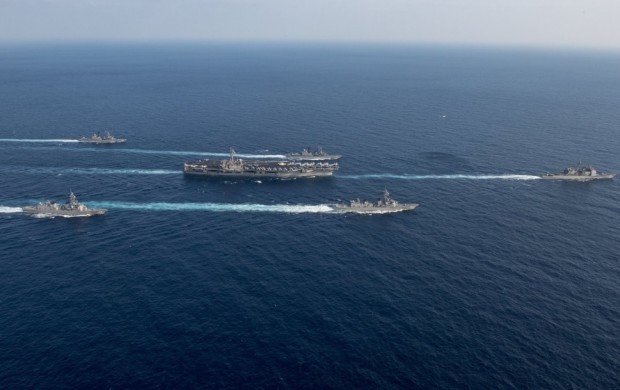
Japan Maritime Self-Defense Force destroyers JS Hamagiri (DD-155), JS Samidare (DD-106), JS Umigiri (DD-158), JS Yudachi (DD-103) and Nimitz-class aircraft carrier USS Carl Vinson (CVN 70), Arleigh Burke-class guided-missile destroyer USS Wayne E. Meyer (DDG 108) and Ticonderoga-class guided-missile cruiser USS Lake Champlain (CG 57, not in photo) participate in a photo exercise in the Philippine Sea. US NAVY PHOTO / MCS 3RD CLASS MATT BROWN
WASHINGTON, United States — The powerful US carrier strike force is already ‘in striking range’ of North Korea, the chief of the US military’s Pacific Command said.
Admiral Harry Harris has told the US House Armed Services Committee that the armada led by the supercarrier USS Carl Vinson was already in the Philippine Sea just off Okinawa, Japan.
Harris added that the naval task force sent to the Korean Peninsula was ready for “power projection … if called upon.”
READ: US vows to force North Korea back to nuclear talks
The Nimitz-class, nuclear-powered Carl Vinson is accompanied by the Ticonderoga-class guided-missile cruiser USS Lake Champlain (CG 57) and Arleigh Burke-class guided-missile destroyer USS Michael Murphy DDG (112).
The admiral made the disclosure as he took responsibility for the “confusion” over the much-hyped deployment of the strike group meant to deter Pyongyang in its nuclear ambitions.
Amid soaring tensions ahead of North Korea’s apparent ramping up for a sixth nuclear test, the US Navy on April 8 said it was directing a naval strike group headed by the USS Carl Vinson carrier to “sail north” from the waters off Singapore, as a “prudent measure” to deter Pyongyang.
But the ships actually went the other way, sailing south from Singapore and toward Australia to conduct drills with the Australian navy — though they subsequently did turn north.
“That’s my fault on the confusion and I’ll take the hit for it,” Admiral Harry Harris, who heads the US military’s Pacific Command, told lawmakers.
“Where I failed was to communicate that adequately to the press and the media, so that is all on me.”
READ: Xi calls Trump, urges ‘restraint’ as US carrier nears Koreas
Noting that the ships had eventually gone on to sail toward the Korean Peninsula, Harris said they are still en route.
“Today (the strike group) sits in the Philippine Sea just east of Okinawa in striking range and power projection range of North Korea if called upon to do that, and then in a few days I expect it will continue to move north,” he told the House Armed Services Committee.
The eventual arrival of the strike group in the region is a far cry from the impression President Donald Trump and other officials left when the deployment was first announced.
“We are sending an armada. Very powerful,” were the words of President Donald Trump, and other officials made it sound like the ships were plowing toward the region.
“A carrier group steaming into an area like that, the forward presence of that is clearly… a huge deterrent. So, I think it serves multiple capabilities,” White House spokesman Sean Spicer said April 11.
Pentagon chief Jim Mattis said the Vinson was “on her way up.”
The ruling party newspaper in North Korea on Monday called the Vinson’s deployment “undisguised military blackmail.”
“Such threat may startle a jellyfish, but can never work on the DPRK,” it said, using the country’s official name. CBB